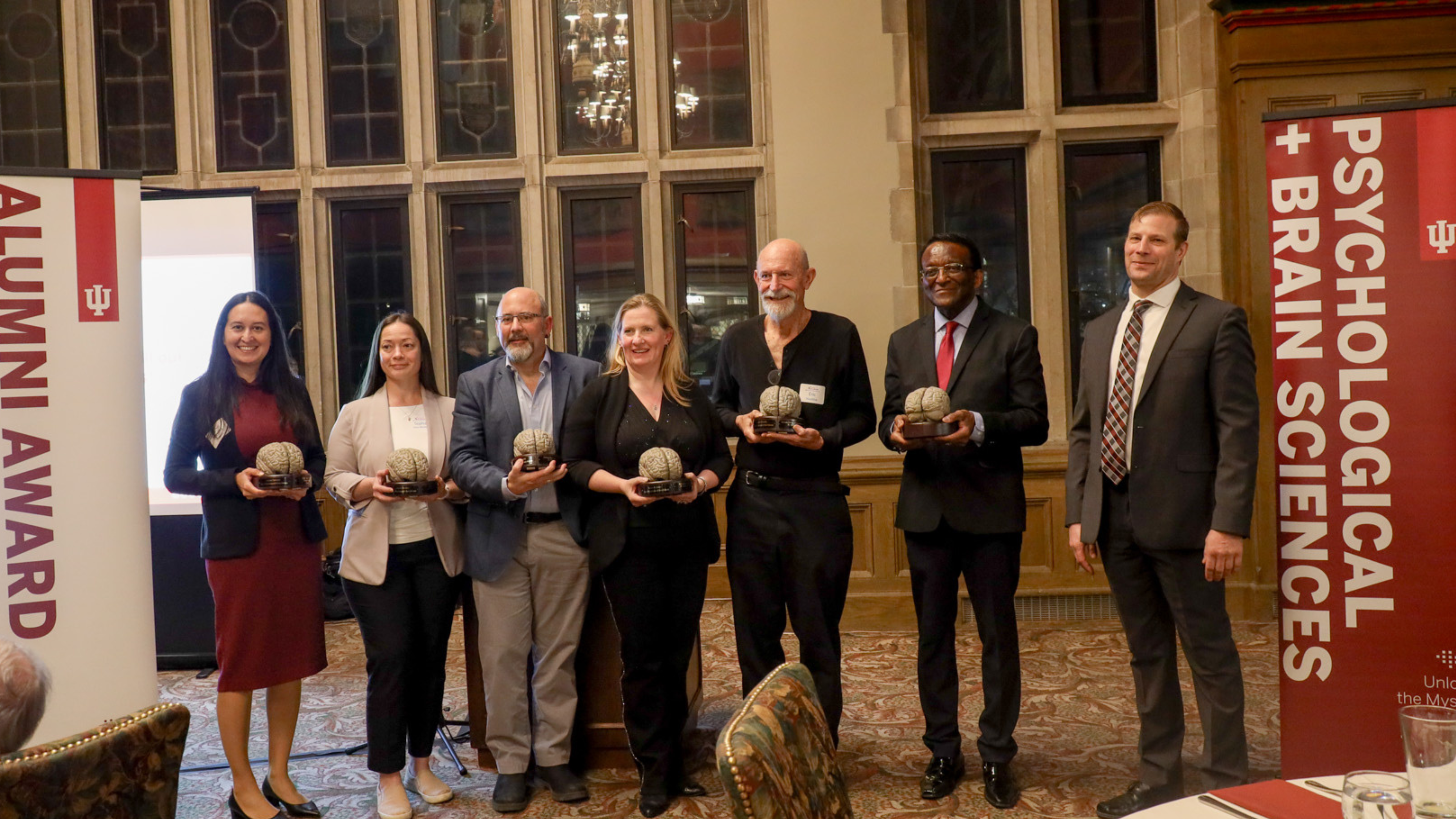On December 9, PBS honored the careers of six extraordinary alumni at the 12th Annual PBS Alumni Awards Recognition Ceremony. The event includes a graduate student poster session as well, giving us a look at the work of current PBS grad students.
“Every year I am perpetually amazed by the group of alumni with whom we reconnect,” PBS Chair Mike Jones reflected. “Their talents, passion and interests inspire us anew and show us the astonishing directions that work in this field can take.”
Jones and several current faculty members introduced the 2024 alumni award winners.
PBS Professor Dorainne Green listed the many ways Early Career Award winner Yecenia Tostado (B.A. 2005) has made her mark on the non-profit community of Indianapolis, while PBS Professor Karin James described the work of Early Career Award winner Sophia Vinci-Booher (Ph.D. 2019), whose innovative grant takes the study of children’s brain development through neuroimaging in new directions.
PBS Professor Linda Smith described the contributions of her former student, Distinguished Alumni Larissa Samuelson (B.S. 1993, Ph.D. 2000), to understanding how language acquisition is related to other cognitive processes and how the accumulation of a child’s behavior, experiences and learning leads to developmental change. PBS Professor Istvan Katona recounted the way Distinguished Alumni John Spencer (Ph.D. 1998) “became hooked in college on thinking about the brain as a complex system” before joining former PBS professor Esther’s Thelen’s lab. Spencer has made huge contributions to the field in such areas as the comparative development of visual working memory in two sociocultural contexts and in building models of brain development.
Introducing Distinguished Alumni Award recipient Jack Thomas (B.A. 1971, Ph.D. 1977), PBS Professor Bill Hetrick highlighted an extraordinary career of service to the field of psychology: as a college professor, hospital administrator, medical expert in the judicial system, and perhaps above all, as a deeply committed mentor. Through his mentorship Thomas has made it his life’s work to further the academic and occupational opportunities of underrepresented students.
Eric Haseltine (Ph.D. 1978), the Richard C. Atkinson Lifetime Achievement Award recipient, illustrates the many occupations you can pursue with a background in psychology and neuroscience – in this case, by one individual. As Jones explained, Haseltine has traveled far and wide in his career: as an engineer, company executive, inventor, volunteer therapist – and spy – as well as a highly prolific writer and public speaker.
Where the story begins...
The poster session introduces us to graduate students at the outset of their careers in psychology and neuroscience, seeking answers to the pressing academic questions of today.
Does the headshot we see depict a real human being or is it an AI fabrication? PBS graduate student Phillip Hegeman in PBS Professor Jennifer Trueblood’s lab suggests that the “wisdom of crowds,” slightly altered, can help answer the question. By amassing the judgements of the more accurate individuals and giving them greater weight, he contends we can increase the chances of detecting the AI-generated headshots.
PBS grad student Zinah George in PBS Professor Natasha Chaku’s lab studies the effects of chronic stress vs. moderate and severe daily stress on adolescent learning. Ultimately, George, who immigrated to the U.S. from Iraq as a child, hopes to use her research to help immigrant and refugee adolescents and children, particularly those in Arab-American communities.
Seeking to understand signaling mechanisms that underlie the development of neurons in the brain, graduate student Jessica Morgan in PBS Professor Anne Prieto’s lab studies these mechanisms within and between neurons in the hippocampus. Currently Morgan is focusing on the study of signaling mechanisms that underlie the growth of neurites, the parts of a neuron that send and receive signals. As Morgan explains, “A better understanding of neurite outgrowth can give us new insights into developmental disorders like autism spectrum disorder and schizophrenia.”



 The College of Arts
The College of Arts